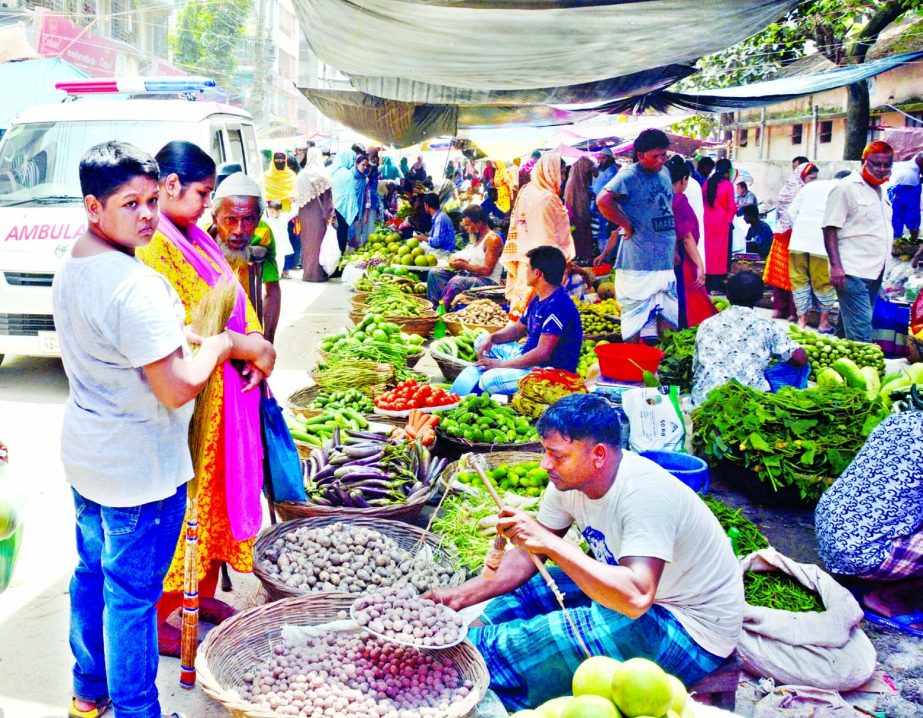
Al Amin :
Country’s lower middle-income group of people are under a big pressure due to the rise in prices of the food grains and other essential commodities.
The people’s income has dropped amid the slowed economic activities due to the ongoing Covid-19 pandemic. On the other hand, everyday expenses are increasing for price hike. Such a situation has frustrated the people.
According to the state-run Trading Corporation of Bangladesh (TCB), the prices of rice increased by 29 per cent to Tk44-55 from Tk34-40 per Kg in the last one year.
Meanwhile, the consumers are paying 37 per cent extra to buy a litre of soybean oil as the prices of the major coocking ingredient increased to Tk 134-140 from Tk 95-105 per litre in last one year.
Like rice and edible oil, other commodities including wheat, sugar, broiler chicken, beef, powder milk and garlic are now costly to the consumers, particularly the fixed-income group of people.
Their worryness has been intensifying as the month of Ramzan-the peak season for the businesses to cash extra profit-is approaching.
Abul Bashar Chowdhury, Chairman of BSM Group, one of the largest food importers, termed the present price chart of commodities as rational compared with the international market. He said there is less possibility of price fall before July this year.
“The stock of imported foods is adequate now. So there is no fear of further price hike in Ramzan,” Bashar said.
Meanwhile, the queues of commoners in front of the open market sales (OMS) trucks of the TCB has got larger in the last few days in the wake of unabated price hike of essentials, although the prices of the TCB’s goods also increased from today (Thursday).
Edible price has increased by Tk 10 per litre while the price of pulses and sugar have increased by Tk 5 to Tk 55 per Kg, TCB sources said.
According to the TCB, consumers can buy maximum 4 Kg sugar at the rate of Tk 55 per Kg, 2 Kg pulse at Tk 55 per Kg, 5 Kg edible oil at Tk 100 per litre, 5 Kg onion at Tk 20 per Kg, 2 Kg gram at Tk 55 per Kg and a Kg date at Tk 80 per Kg from the trucks.
TCB spokesperson Md Humayun Kabir told The New nation that a total of 500 trucks are used selling the four essential items across the country of which 10 were operating within the capital as part of the Ramzan sale.
Abdullah Raquib lives with his wife and son at a rented house in the capital and works in a private company and hasn’t received his monthly salary of Tk 35,000 on regular basis for more than six months of last year. He pays Tk18,000 as house rent and utility bills every month.
“I had to take financial support from my relatives to meet my family expenses as my salary was irregular. Daily expenses have been given priority. How can I manage the expenses now if the price of essential commodities goes up unabated?” Raquib questioned.
The prices of the essential goods, mostly depended on import, are blamed the global market for the rise. Several large business groups control the import of goods in the country and increase the prices by syndicating.
Sugar prices rose to Tk 75 a kg while branded sugar prices remained static at Tk 75-78 per kg.
Adding to the woes of the consumers, prices of beef, both broiler and indigenous chicken, vegetables like brinjal, local bean, cucumber, cauliflower and cabbage prices showed hike in the city’s kitchen markets.
Beef was sold at Tk 560-620 per kg based on quality- a Tk 10-20 a kg hike – in the city. Broiler chicken prices increased to Tk 160-165, layer Tk 220-230, Pakistani Tk 350-370, indigenous Tk 460-500 a kg- Tk 5-Tk 20 a kg hike in the week. Vegetable also became pricier, witnessing Tk 5-20 a piece /kg hike in the last.

